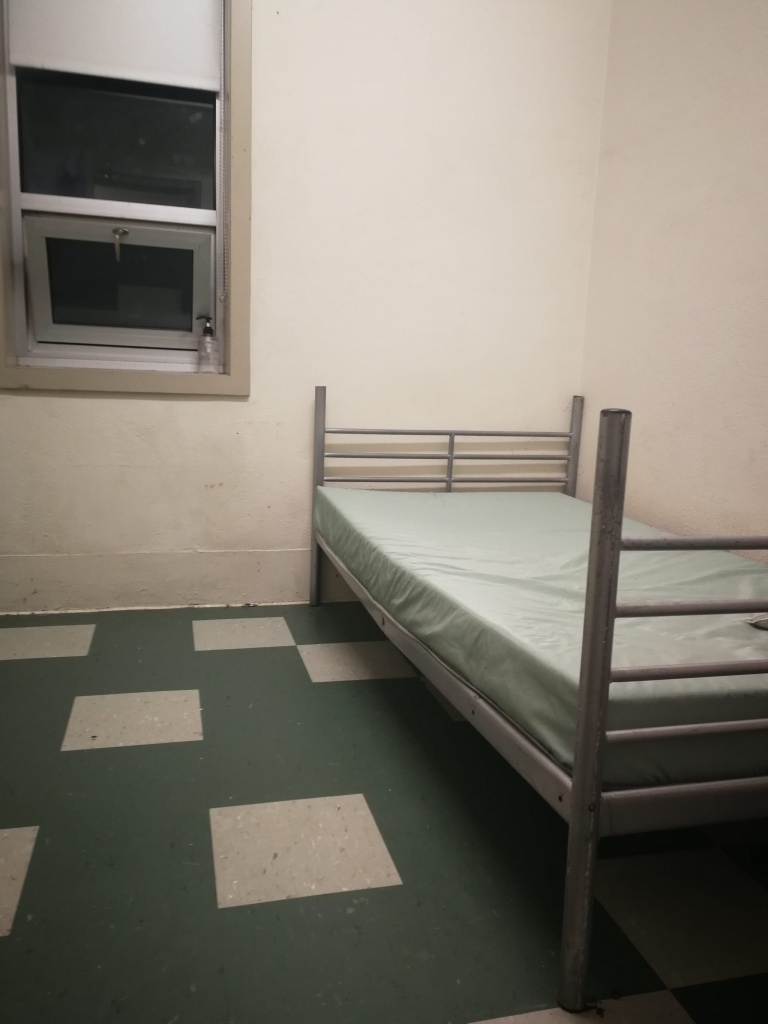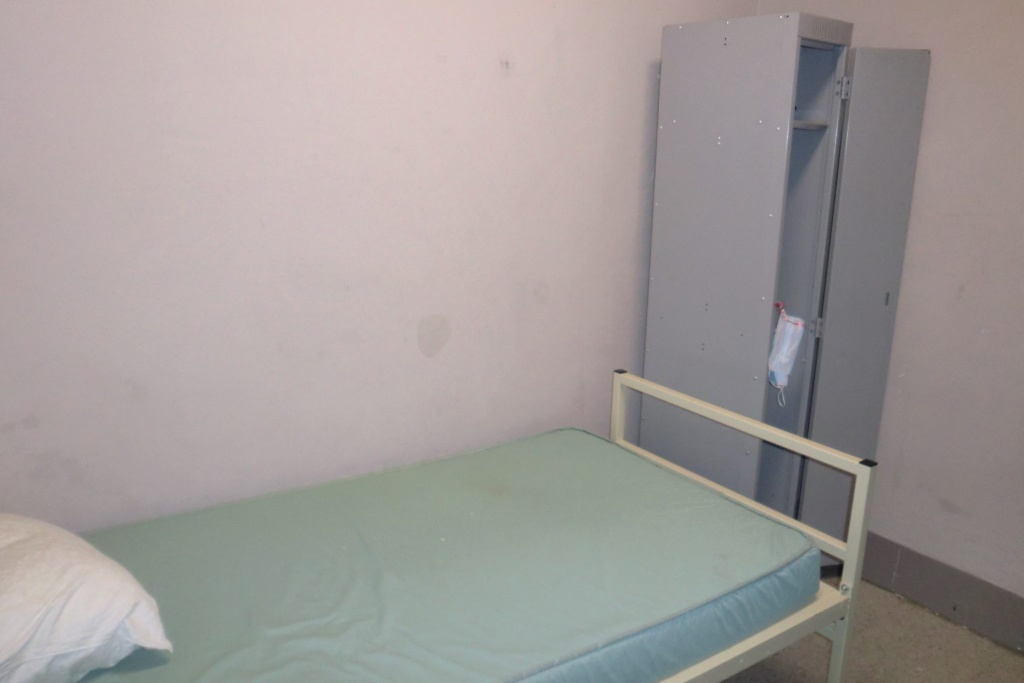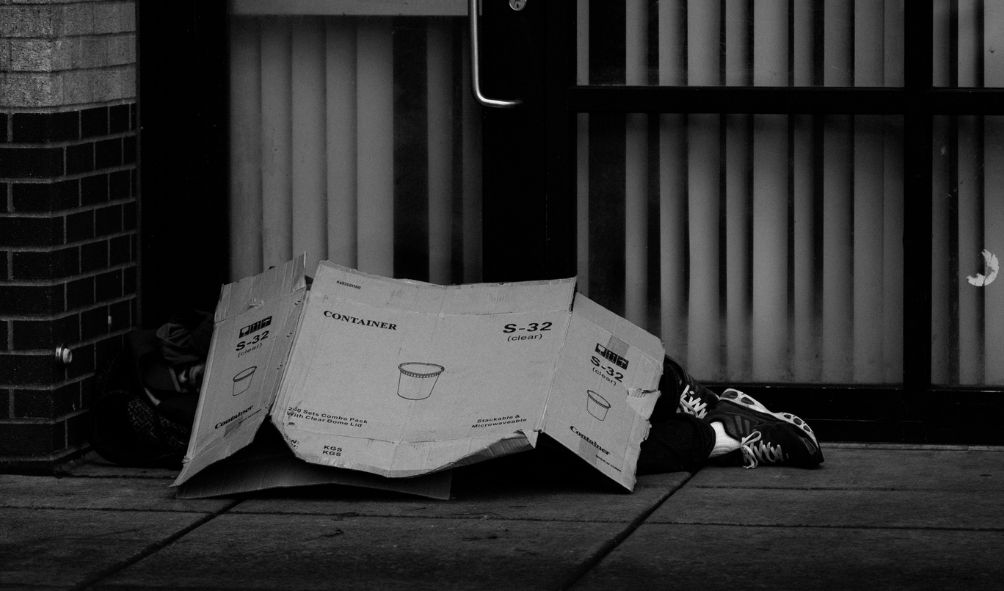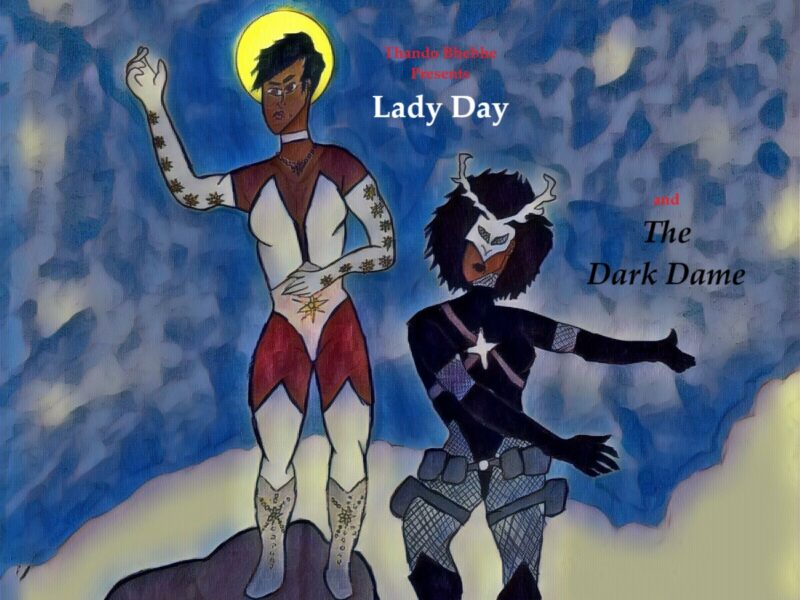CONTRIBUTED CANVA / THE SPUTNIK PHOTOGRAPHY
—I was asked to describe my job badly, I said I watch people die and am often required to tell them they don’t get to eat.
Disclaimer/ Trigger warning: In order to protect the identity of those involved, names have been changed. The following depicts a violent encounter in which The Sputnik mentions blood and trauma.
I hadn’t been working at a homeless shelter for a couple months when the most violent experience of my life occurred.
It was during shift change and I was wearing these silly pink sneakers I’d bought off amazon. I’ve since thrown those shoes away. I could barely look at them after that night and even though everyone said there wasn’t any blood on them, I knew there was blood on them. I work the weekend nights shift, starting at 11pm, with a colleague, Lyla. When we arrived for our shift that night, it seemed like any other night.
Shift change is when we learn about everything we need to know that happened during the shift prior. It wasn’t even two minutes into shift change when Kai, a long-time client of the shelter, ran to the front desk screaming that someone was being murdered upstairs.
Since starting my position, I have experienced a lot of things I was prepared for and a lot of things I wasn’t prepared for. I was prepared to provide advocacy and crisis intervention to a marginalized community. Armed with the knowledge that people’s worst moments in life are deeply influenced by systems of oppression, I was prepared to put empathy and allyship into practice.
I was prepared to see people’s bodies give out on them, and to witness them hurt themselves without wanting to.
I was even prepared to be deeply challenged by a non-profit system corrupted by capitalism. But I was not prepared for the attempted murder, nor the countless overdoses, psychosis, necrotic flesh, robberies, or a suicide attempt.
When Kai screamed at us for help, we only heard that there was someone with a large weapon upstairs. That’s a trauma response. When you are only able to register vital information and the rest just sort of floats around you.
We ran towards the person with a large weapon because that’s our job. I’m about as qualified to respond to a person with a large weapon as a toddler with a jar of angry wasps but nonetheless, we ran towards the trauma like we always do.
We see trauma and we hear about trauma; that’s a given, but we also perpetuate trauma. Part of the “Operating Principles” at my work is the use of, “behaviour-based criteria for restricting access to shelter.”
Making determinations as to whether a person may access a bed to sleep in or food to eat based on behaviour perpetuates harm against people experiencing homelessness because the criteria is universal and the assessment is done through a colonial lens.
The standard to which people are expected to behave is based on the colonial ideal. The ideal is a white, CIS, man with no mental health issues, no history of trauma, no addictions and no physical disabilites. This man has no trouble governing his behaviour to the standard to which is expected because the standard is literally based on his capacity. None of the clients I work with fit into this colonial ideal.
Universal rules mean that a person’s lived experience, and the trauma they have experienced through it, is never considered when assessing their behaviour.
Non-western conceptions of justice do not share this idea that access to service should be linked to a person’s behaviour. Rather, there is recognition of the role that society plays in affecting a person’s behaviour. As an employee of the shelter, I need to enforce these rules without considering how the different aspects of people’s identities affect their ability to follow these rules or their access to service elsewhere.
For racialized folks, accessing mental health services means availing themselves to the risks that come with being in vulnerable positions where their autonomy may be challenged. A lot of the folks I work with are justifiably resistant to any assistance because like Kai, they have been repeatedly harmed by systems that are supposed to help.
One of my duties is applying service restrictions on folks who are found with drug paraphernalia after a certain amount of warnings. But what if they are disabled and it’s snowing, and service restricting them means they have to trek through the snow to another shelter before dinner is done?
I have no choice. No discretion.
What if it means putting them at risk of getting injured and they won’t get to eat tonight? That’s not part of the assessment criteria. The amount of warnings previously given—that’s it. It doesn’t even matter if the drug material has been used or not.
The harm I see is continuous.
Folks suffering from mental illness are expected to regulate their behaviour to a standard set for a person who does not have a mental illness. Those suffering from traumas that are invalidated in society, such as immigration, racism and being homeless, are expected to regulate their behaviour to a standard that was set for a person who has not experienced any of these things.
“Behaviour-based criteria for restricting services,” means that I impose restrictions that result in people not having shelter in winter and not being able to access meals.
Lyla told me you can get burnout from your ethics being challenged and I felt that. My burnout shows up as procrastination—it’s taken me way too long to write this, for example. Sometimes, it shows up as willful apathy.
How I feel when I need to tell people to leave the building when I know they have nowhere else to go is slowly turning from guts churning to a much more bearable sort of mental anguish. I mitigate my repulsion by sending them off with food and anything else I can find that might help them make it to a lobby they won’t be kicked out of until the sun is out.
I’m new to this field, but my awareness of how nonprofits are bound to fail the communities their mission statements claim they exist for, is not new.
The way Kai was treated after what happened is not new. But this time it was different.

PHOTO BY TANYA O’CONNELL/ THE SPUTNIK PHOTOGRAPHY
As we ran through the doors and up the stairs; we all saw the weapon in their hand. The person with the weapon had walked out of a door on the second floor landing and was making their way towards the stairs when the unfazed security guard tackled them and the weapon was dropped.
There was action all around me but all I saw was the weapon. I kicked it down the stairs and then chased after it. I picked it up and brought it to the front desk where Lyla was.
I realized, as I laid the weapon on the ground and saw there was blood on it, this meant there was probably a victim. I ran to where I thought I might find someone in need of help. What I found was indescribably graphic. The victim survived, but finding them that night is a sight I don’t think I will ever be able to forget.
Lyla was my lifeline after that. She kept me from hyperventilating to the point of passing out. When she was treating me for the physiological shock I was experiencing, she couldn’t find any ice so she had me put two bags of frozen fruit on my head. I immediately felt calmer.
She said the extreme temperature was forcing my body to stop, slow down. Breathe. It was working, and as my guard started to fall, the tears came. I felt safe with Lyla until we were interrupted by what felt like thousands of police officers barging into our locked staff room.
Someone told the police that I was a new staff and in response to this information one of the officers implied that I should take comfort in knowing it was the worst thing they’d seen there in the 13 years they’d been a police officer.
What is really sad is that I believe this was a genuine attempt to make me feel better.
“Although (this shelter) is notorious for being really violent”, the officer added.
We spent most of our shift at the police station being interviewed on camera. The next day all staff at the shelter received critical incident stress debriefing, provided through our employment assistance program.
What happened constituted a WSIB workplace injury, involving psychological trauma, so I will receive trauma counselling for as long as I need it and if I can’t work because of it, I’ll still get my pay cheque.
Kai, on the other hand, whose trauma was significant considering they saw the attack happening, got absolutely no support that would mitigate the risk of them developing PTSD.

PHOTO BY TANYA O’CONNELL / THE SPUTNIK PHOTOGRAPHY
One of my duties is booking people out if they miss more than one of the three bed checks I do through the night. But what if they aren’t in their bed because they have unmanaged schizophrenia and they’re at the front desk with Lyla and I colouring all night? Doesn’t matter, they would get booked out. Not being booked in means they don’t get access to services, like breakfast in the morning.
When they approach the front desk for a meal ticket in the morning, they find out they don’t get to eat. And that their belongings will be packed up by staff and put into storage until 6p.m. that evening. Depending on how badly they take this cruel news, they can book back into the shelter after dinner. How charitable, right?
Trauma responses are not pretty or neat or convenient. Nobody can foresee how they will react to trauma. For me, I barely remember the events that happened on the landing, while I remember the victims injuries vividly. It seems backwards, and at first it was incredibly frustrating to not remember some parts while remembering what I wished to forget.
The privilege of access to education has provided me with insight on how memory and trauma intersect. In Carol Tavris and Elliot Aronson’s book, Mistake Were Made, But Not By Me, this intersection is explained.
Not being able to remember is my brain protecting me from what happened on the landing. On top of that, I have my own narrative in my head about who I am and how I would react in a crisis situation. I have a temper and I’m fiery and I yell when I’m mad. And like everyone, when there is a conflict between my pride and my memory, my pride will win. So I don’t remember that I froze on the landing.
The very next night when Lyla and I were reading over the communication log from the dayshift, we learned disturbing news about Kai. I was not prepared. Reading what happened to Kai felt so personal and stung so deeply that reading it literally brought me to my knees.
Despite everything that happened the night before, Kai was restricted from the shelter only a few hours after they got back from the police station.
Kai was restricted from service because they had a trauma response to what happened. That behaviour was outside the standard to which they are expected to regulate themselves and so, out they go.
Kai was sleeping on the floor in the shelter hallway and was startled when staff woke them to ask them to move. Kai had a trauma response to being scared as they woke up. I should mention that when the victim was attacked, the victim and Kai were asleep.
Kai felt disregarded by the way they were woken up and said some violent things. Things incredibly reminiscent of the trauma they saw the night before. But the trauma they experienced is not part of the assessment criteria when determining whether someone will receive a service restriction. Kai was service restricted for two weeks.
No consideration for what Kai saw the night before was given. Universal rules applied. They should have been able to govern themselves exactly the same way as everyone else. When Lyla and I found out, we cried because we felt the betrayal Kai must have felt. We were supposed to help them.
What happened still deeply affects me. I cannot allow anyone other than security to walk behind me when I’m at work. My own son cannot stand behind me without me feeling panic. The sound of people running down the stairs immediately brings me back to the sound of Kai running towards the front desk as they were yelling for help. None of these trauma responses were predictable but some of them are rooted in my previous traumas.
Kai had a reaction too, one of them that morning, and it was likely rooted in their previous traumas too, but instead of compassion and insight, support, and medical care – all the things I got, Kai got to sleep on the street for days until their service restriction expired.
All because they weren’t able to follow universal rules after experiencing psychological trauma while experiencing homelessness and battling an addiction. And that’s just what I know for sure.
People will argue against the necessity of recognizing different aspects of identities when creating rules that affect people’s survival.
They will say the harm comes from socialized medicine being inadequate and declare themselves the master of the debate team. They will say violence happens in shelters because people experiencing homelessness are violent.
That universal rules are the only way to ensure fairness and the government agrees with universal rules or they wouldn’t fund homeless shelters. They’ll swear anything else is impossible, that it’s universal rules or no rules and that people would suffer under an alternative.
But as a frontline homeless service worker, I’m telling you, the harm that universal rules cause is real.
Discretion is justice.
And Kai deserves better.




